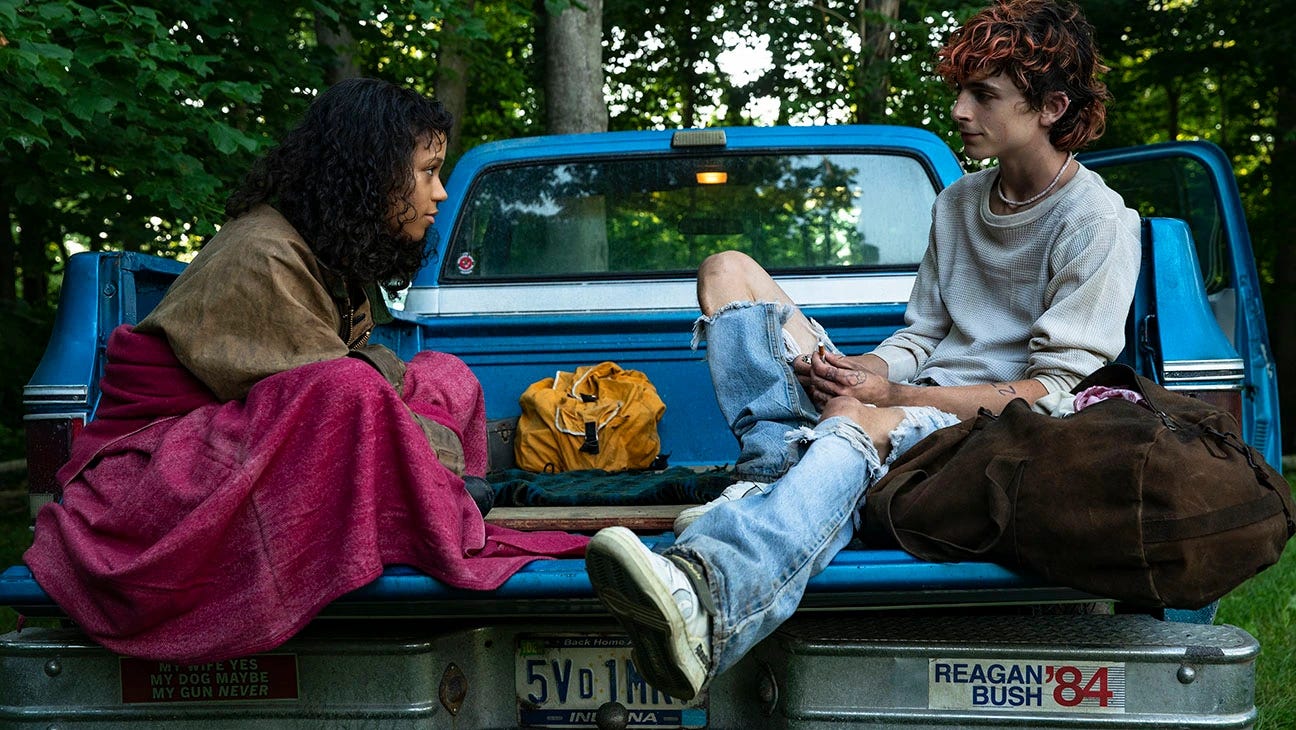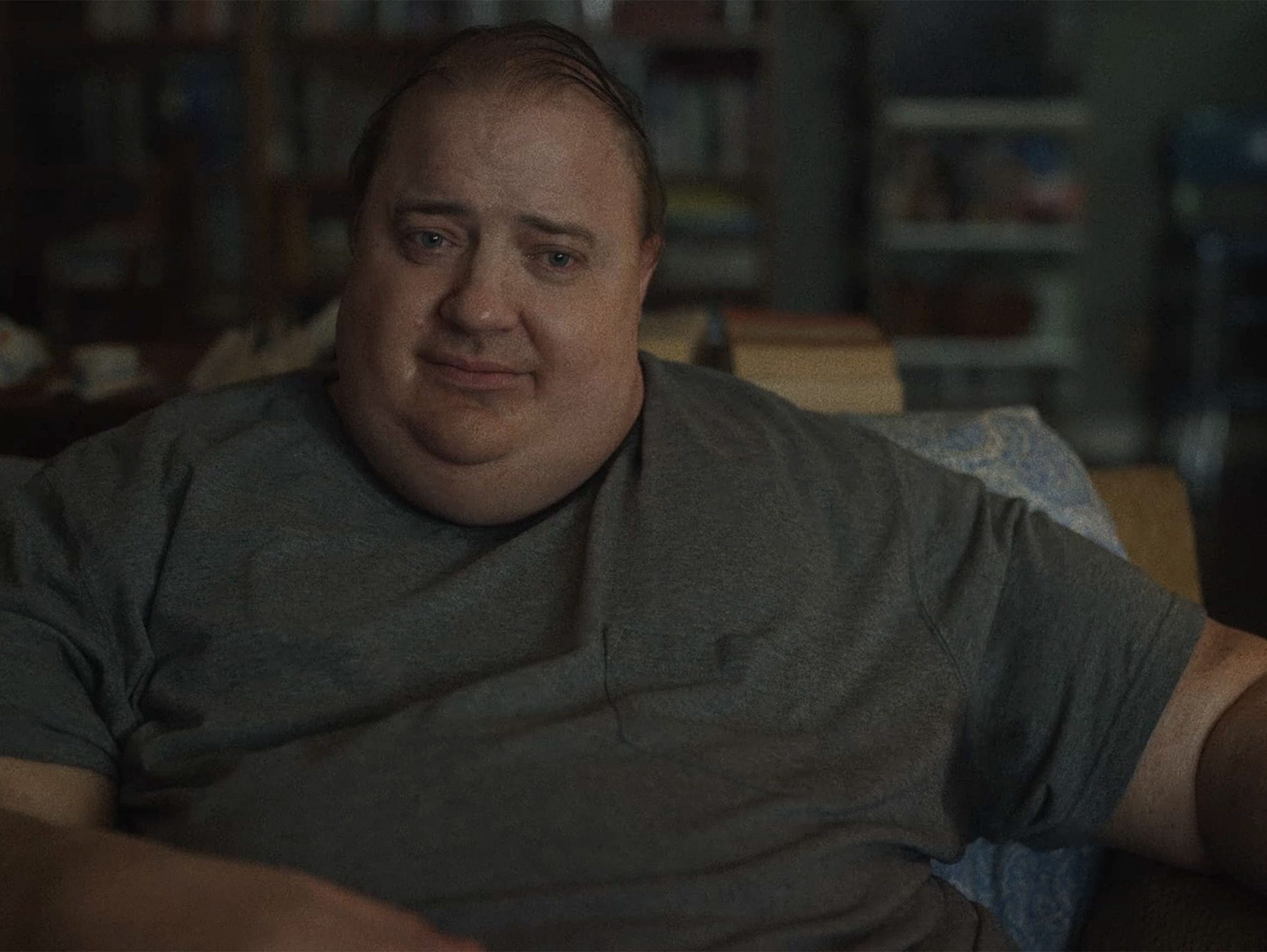Two issues in one week. Could it be true?? Yes, dear reader, we’re back again; still trying to watch and cover all the movies we can before the holiday stupor really kicks in and we start hibernating for the winter (or until January). What can we say? Our appetites are pretty big.
In that way, we have two movies this Friday that deal with the hunger and cravings we all experience — for love or otherwise. Even if they’re two very distinct experiences. First up is Zosha on Bones and All (what you may know as “the Timotheé Chalamet cannibal love story). Then Cate rips into Darren Aronofsky’s latest controversial film, The Whale.
We’ve got one more issue coming down the pike for you before the sun sets on 2022. But the meantime, take these reviews in. And as always, happy movie yelling.
Zosha on Bones and All
Bones and All is a helluva thing. There are several ways for you, the reader, to take that statement — overwhelming acclaim, outright disdain, a copout of an opener (I’m on a 30-minute time limit; we work with what god gives us!). It is possible to read Bones and All in any of these ways, that’s sort of the appeal of it.
If you don’t already know: Bones and All follows Maren (Taylor Russell), who has cannibalistic urges she can’t seem to tamp down on. When her dad deserts her, unable to deal with his daughter’s condition, she’s left to fend for herself as she travels across the country in an attempt to find her mother. Along the way, she meets other “eaters,” including Lee (Timothée Chalamet). The two fall in love and continue her search, finding a lot more along the way.
Again, we’re dealing with a time limit and a holiday cookie party brain this week, so take that somewhat rote description with a grain of salt. If you have seen any of Luca Guadagino’s films (or maybe you were one of the handful of folks who finished his HBO series; props to you!), you know that his work often settles itself in the sort of transitory, ethereal landscapes of both earth and emotion more than it does a simple story. His movies capture moods like dappled sunlight on skin, warm and fleeting. In this, he is the perfect person to channel Bones and All’s story to the screen: This is a tale whose allegorical nature constantly threatens to tip too far and topple the whole thing on itself. And instead, each new scene is its own perplexity, building the story further and further out.
Certainly you could nail Bones and All’s Whole Thing™ to neatly map onto a single narrative. But part of the appeal is that you don’t want to, or that it’s more fun not to anyway. For me, I like what Bones has to say about love, how it is so profoundly intertwined with coming of age and inflected with the knowing (and not knowing) of yourself. (Light spoiler warning) Maren’s dad saw her before she could see herself; and in a way, her mom did too. And in both their way they thought it doomed her. Yet she and Lee find something together, exploring this twisted side of themselves as best their able, in fits and starts. That coming into adulthood and love is something that can draw you to people, create walls and dismantle them in equally, terrifyingly interesting ways. It’s a shared passion; a truck driven to the very end, through expansive Midwestern countryside.
Bones and All’s road movie narrative allows for a more natural rhythm — its own bit of fitfulness that can sometimes rankle. Again, nothing about this movie fits very neatly into a box; even the lyricism of my own favorite reading still has to grapple with the cannibalism of it all, a grotesquerie by design and purpose but a visceral one nonetheless. In some ways, I find Bones and All to be more a movie I appreciate than actively like. But still, it’s a thoughtful story, even in the times when I felt betrayed by it. "Why does love — the absence of love, the end of love, the need for love — result in so much violence?” is a question that Women Talking didn’t know what to do with and Bones and All ate the fuck up. It’s a helluva thing.
Cate on The Whale
Fuck this movie.
I wish I could be more expressive and articulate in my disdain, but my analysis of Darren Aronofsky’s The Whale begins and ends at “fuck. this. shit.”
I am famously an easy critic to please. All I ever really want is a story that makes me feel. I yearn only for films that move me and give me a window into the lives of characters who are both similar to and unlike myself. But as a fat woman who is just now in her 30s unlearning all the ways fatphobia has damaged my body and mind, The Whale is very possibly the most offensive and upsetting thing I’ve ever seen. And Andrew Dominik’s Blonde was only released three months ago.
It’s fairly clear that Brendan Fraser's performance in this film will earn him a Best Actor Oscar nomination next month. He’s riding high on two favoured Academy narratives — the comeback and the transformation. I wish him nothing but the best. His run of films in the 90s was very meaningful to me and I’m delighted he’s returned to acting. But this detestable film is the worst possible way to do it. The idea of Fraser being rewarded for having the “bravery” to exist artificially in a body many people do in fact live with fills me with a rage I didn’t know I possessed.
I’m loathe to even describe the film’s plot, because even that is secondary to the spectacle of Fraser in a fatsuit, wheezing and heaving — dissolving into coughing fits every time he laughs. I am sick of stories about fat people only ever centering on self-loathing. I am sick of fatsuits that misjudge the proportions of fat bodies — emphasizing our corpulence and depicting us as misshapen puppets or towering monuments of disgust. Most of all, I am tired of stories about fat people that do not even include us. I shouldn’t ask because I know the answer, but why are filmmakers so intent on humiliating people of size? Why are they so dedicated to the narrative that our fatness is what kills us? Why are they so blind to the fact that it is the prejudices reinforced by lazy narratives like these that do us the most harm?
The irony is that the movie subjects Fraser’s character Charlie to many of the same indignities fat people face in real life. He is not a person but a body taking up space. His physical form is an object to be abused. He is dying but continues to disregard his health. He reflects every repulsive trope that has ever been used to demonize and reject fat people. There are scenes of bingeing and purging that were so triggering I had to look away. The idea that fatness and self-respect cannot exist in the same body is so pervasive that this film doesn’t even both to interrogate it with any real curiosity. Here, fatness is something he needs to be saved from. As per usual, Charlie is fat, and therefore his life is a tragic, cautionary tale.
It was clear to me by the first few scenes that Charlie would be dead by the end of the film. But not even in death can he find dignity. Instead, his heart gives out when he tries to carry himself — a “poor, big animal” — across the room to his daughter without a mobility aid. Those words mind you, are narrated by said daughter from an essay she has written about Moby Dick and is now reading aloud to him at his request. As they escape her lips, guess who pulls himself up to his full height for the first time in the film? I’m not ashamed to say the juxtaposition made me burst into tears. To see so plainly the way the world thinks about people in bodies like mine was painful and upsetting.
To quote myself — “Pop culture does not exist in a vacuum. It is a feedback loop that is both sustained by and contributes to the way we see ourselves as a culture, and in relation to each other.”
I am tired of being made to hate myself because filmmakers lack the imagination to conceive that fat people’s existence need not be built on a foundation of self-loathing.
Aronofsky can shove it.
Assorted Internet Detritus
ZOSHA: OK well I was only here two days ago so let’s see what I read that I really loved in a couple days: Pokémon of the future! don’t look like what you expect. TV streaming of the future isn’t too hot either. Nepo babies we love, and what we lose when Tarantino becomes a film critic.
CATE: Personal style is dead, how video vixens influenced pop culture, the obvious answer to homelessness, Steve is still your best friend, the death of black twitter, and why you should just… throw a party.
If you’re just finding this newsletter, do us a favour and subscribe. It feeds our fragile egos. And if you’re already a loyal reader, help us out and tell a friend. Happy movie yelling!
Zosha + Cate <3
twitter:@30FlirtyFilm
instagram:@30FlirtyFilm









